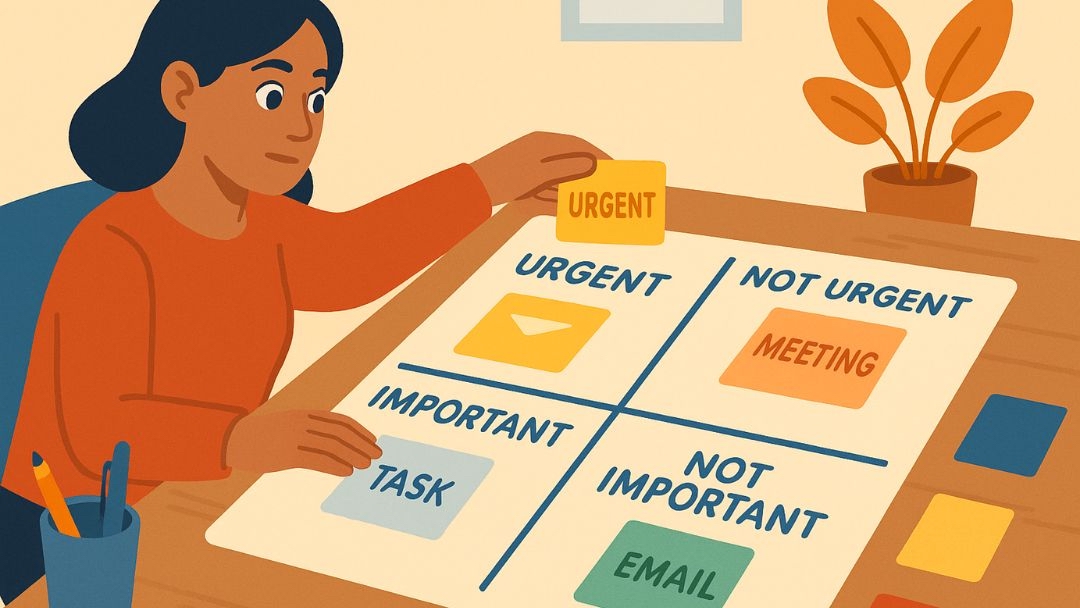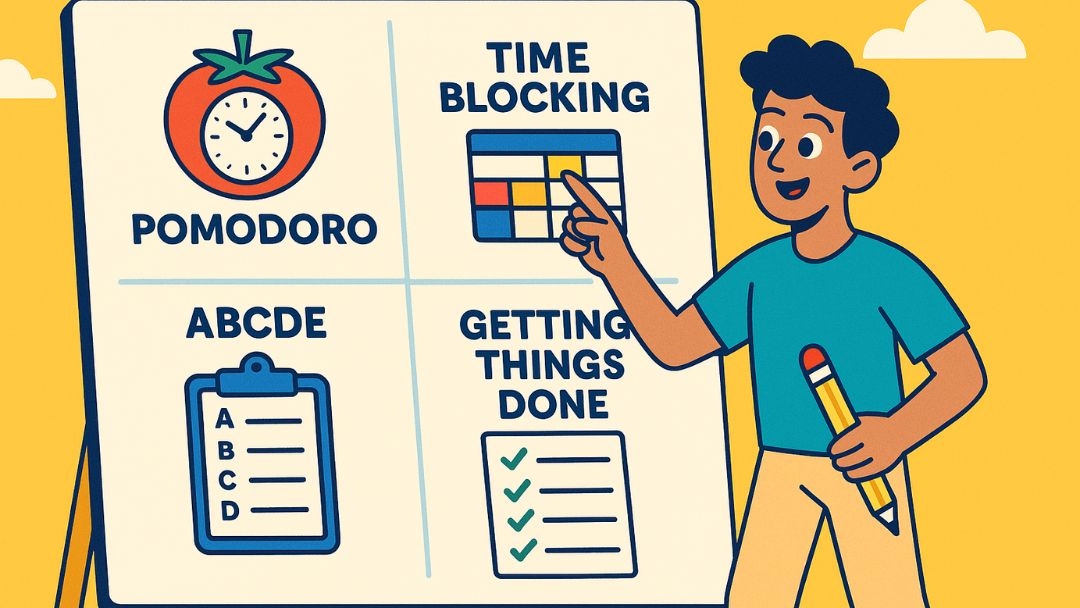How Do I Manage Time More Effectively? Guide To Better Time Management
Time management is among the most in-demand skills in today's job marketplace. Yet, despite its importance, many people have no more than an elementary knowledge of what it is. It’s time to change that!


Back
8 mins read
Are you constantly missing deadlines? Drowning in an ocean of tasks? Or working hard but getting little done? If so, you may need help with time management.
Time management is essential for anyone looking to achieve professional success and maintain a balanced life, but it is often poorly understood.
In fact, for many, time management extends only to to-do lists and daily planners. According to 2022 statistics, only 12% of participants in the US and UK use a dedicated time management system. Among those who use a system, Time Blocking, Rapid Planning Method, and the Eisenhower Matrix were the most commonly used.
In reality, however, much more is involved in practicing good time management. This article lays it out, starting with what time management is and the essential skills you'll need to become good at it. It also includes tips for building your time management skills and recommended techniques to help you focus your skills and become more productive.
This guide will introduce you to the different skills required for you to manage your time most effectively.
You will learn what these skills are and why they are important, followed by a list of tips and techniques to implement each skill best.
If you haven't taken the BrainManager, How Good Are Your Time Management Skills? assessment yet, we recommend doing so. It will help you determine your areas of strengths and weaknesses for each core skill. It’s one of our free tests!
After reading this article, and identifying the areas where you need improvement, check out the BrainManager member's area to learn more about each skill and how to implement the recommended time management techniques.
Let's get to it; time's a wasting!
What Is Time Management?

Time management means planning and organizing your time to maximize efficiency and productivity.
The idea is that while you cannot alter the number of hours in a day, you can change how you spend them. Moreover, incorporating time management into your workflow can drastically reduce stress and time wastage, improving productivity.
Time management also encompasses the techniques, tools, and systems that help improve time efficiency. That includes methods like the Pareto Principle, tools like time-tracking apps, and individual time management systems.
Time management is not a singular skill, as many believe. It encompasses many skills, including prioritization, scheduling, organization, delegation, etc.
Time Management Skills Vs. Time Management Techniques
Before diving deeper into time management, you must understand the meaning and difference between time management skills and techniques. Even though the two are tightly interlaced, they are distinct and uniquely affect time management.
First, time management skills are those intangible capacities that enable you to practice time management. It refers to intrinsic capabilities like planning, decision-making, and boundary-setting that help you use time efficiently.
Time management techniques, on the other hand, are the methods or playbooks by which you learn and apply your time management skills. They usually have steps and rules that result in predictable outcomes if followed correctly. Examples are timeboxing, deep work, and the Pareto principle.
If you still need clarification about the difference, here’s an example.
Think of it this way:
- Prioritization is a skill because it refers to your ability to organize tasks by importance.
- The Eisenhower Matrix is a technique that helps you learn and apply your prioritization skills.
Better time management can help reduce stress at work. However, if your job has you feeling overworked and more than just "unhappy" — where it is affecting other areas of your life, relationships, health, or overall well-being and mental health — then it's time to assess the severity of your symptoms.
What Are the 7 Core Time Management Skills?

Good time management starts by possessing the proper skill set.
Without it, even the best techniques and tools will be useless.
While several time management skills exist, seven are absolute must-haves. They are:
- Goal setting,
- Prioritization,
- Managing interruptions,
- Avoiding procrastination,
- Scheduling,
- Organization, and
- Delegation.
Let's look at each of these core time management skills in more detail.
Goal Setting
Goal setting is the first step in your journey to becoming a good time manager. It is the process of identifying your desired result and making plans to achieve it. Your goals influence your time management strategy. Therefore, clear goals result in precise strategies and well-defined tasks, while murky goals lead to confusion and inefficiency.
Having clear goals provides direction, not just for you but for everyone on your team. You don't have to waste time second-guessing your actions or wondering what to do next. Instead, you can quickly prioritize and focus on where it matters by evaluating your activities within the broader context of your long-term goals.
Goals can also be drivers, motivating you to get things done before their deadlines.
Tips for Better Goal Setting
- Base your goals on your past experiences and build on them from there.
- Create short, medium, and long-term goals.
- Write down your goals and the strategy for achieving them.
- Give each goal a time limit.
- Reward yourself every time you meet your goals.
Goal Setting Techniques
- The Staircase Model
- SMART Goal Setting
- Areas for Change Model
- Rapid Planning Method (RPM)
Scheduling
Once your goals are defined, you can start working on a plan for fulfilling them. This is where scheduling comes in. It is the process of allocating your time to tasks in order to fulfill your goals.
Scheduling is crucial to good time management for several reasons. First, it helps you utilize your time efficiently by fitting all your tasks into their respective time slots. This, in turn, enables you to avoid stress and boosts productivity. Next, it ensures you don't overwork yourself and burn out by making concessions for rests and breaks.
When there's a lot to do, a schedule makes it easy to tell whether you can take on more work or if it's time to delegate. It also makes it easier to prioritize and consider task dependencies.
Scheduling Tips
- Don't forget about downtime. Schedule regular breaks and rest periods.
- Make your schedule flexible. Don't be afraid to move things around when situations change.
- Make your schedule the day before. Spend a few minutes developing your plan every night so that you can get right on it the next day.
- Mark off each completed item on your schedule. Doing so creates a feeling of accomplishment that will motivate you to keep working.
Scheduling Techniques
Prioritization

Not all tasks are created equal. While some are indispensable to your goals, others are mundane and can and should be outsourced.
Prioritization is determining the hierarchy of your tasks by ranking them according to importance, time sensitivity, and required effort.
Prioritization is handy for time management when there is too much to do and too little time. It allows you to focus your attention on high-value tasks so that you can push back or delegate low-priority ones.
Additionally, it helps you uncover task dependencies and create efficient schedules.
Tips For Better Prioritization
- Understand your goals.
- Create a master task list.
- Learn to say "No" when your hands are full.
- Constantly review your priorities, as they may change.
Prioritization Techniques
Managing Interruptions and Timewasters
Once interrupted, it can take up to 25 minutes for you to refocus on your task.
Multiply this by the countless distractions you're bound to experience from colleagues and bosses in a day, and it's no wonder we get very little done at work.
Managing these interruptions can save you countless hours of being unproductive at work. Research suggests that there may be a connection between our ability to manage interruptions and personality traits such as openness to experience and a need for structure.
One way to achieve this is by minimizing the number of distractions you experience during work. Another is developing strategies for addressing them.
Tips for Managing Interruptions
- Designate a specific time for responding to emails.
- Don't multitask.
- Create a distraction-free workspace.
- Turn on "Do Not Disturb" on your phone.
Techniques for Managing Interruptions
Avoiding Procrastination
There are several reasons why people procrastinate.
Some do it because they are afraid. Others overestimate themselves and scramble to complete projects. At the same time, some procrastinate because they are unmotivated about their work.
Whatever the reason, recognizing and avoiding procrastination is a crucial skill for time management at work. Getting an early start on your projects helps you manage your workload and prevent things from snowballing out of control.
Tips For Avoiding Procrastination
- Practice self-care. Good sleep, a healthy diet, and exercise put you in the best frame of mind to get your work done immediately.
- Publicly committing to complete and delivering on a task can motivate you to get it done.
- Consider the pros and cons of delaying your task.
- Break down big tasks into smaller chunks. That way, formerly impossible tasks seem more manageable.
Techniques for Avoiding Procrastination
Organization

Studies show that as much as 30 percent of working time is wasted looking for misplaced items. Another study found more than half of office professionals report wasted time searching for digital files due to poor online organizational systems.
Conversely, a sound organizational system makes locating anything you need easy while saving you tons of energy and time.
There are two types of organizational skills you must develop. The first is physical organization, which refers to your ability to locate files, documents, or other objects required to perform your job. The other is mental organization, which refers to your ability to research, analyze situations, and think strategically.
Both are crucial for time management. With good organizational skills, everything has a place, and you can find what you need when needed.
Organization Tips
- Declutter your workspace.
- Organize frequently. Don't wait for things to get messy before cleaning up.
- Update your filing system.
- Sort your emails.
Organization Techniques
Delegation
No matter how efficient you become at using your time, you'll never be able to do it all.
Prioritization can help you do high-value tasks over low-value ones. Still, even low-value tasks need doing for business to run smoothly. Delegation helps solve this problem by offloading excess responsibilities to other team members to manage your workload better.
Delegation is most difficult at the beginning, but effective communication is one of the most significant factors in ensuring its success. You need to explain the task, the outcome you expect in terms of quality, quantity, and timeliness, the available resources, and the level of freedom the delegate has to complete the task.
The fruits of your delegation will begin to pay off as the job skills of your team develop, making them more effective at their jobs. They will also be increasingly motivated by the opportunities to learn and grow. Consequently, you will have fewer responsibilities and more opportunities to grow by taking on new challenging tasks.
Delegation Tips
- Capitalize on the strengths of your teammates; communicate according to their style.
- Be patient. You probably won't get it right the first couple of times, but don't let that discourage you. You can learn from your failures and eventually perfect your workflow.
- Give and ask for feedback.
Delegation Techniques
What Are Time Management Tools?

Tools exist to make tasks easier and improve productivity; the same is true for time management tools. You can use them to record time, track activities, prioritize tasks, and coordinate with teammates.
There are different kinds of time management tools, ranging in complexity from simple to-do lists to complicated time-tracking software. Some of the most useful ones are:
- Calendar
- Notebook/note-taking app
- To-do list
- Time tracker
- Task manager
What is a Time Management System?
Once you've better managed your time for a while, you'll realize that specific skills, techniques, and tools are more suited to your personality or work style than others.
Over time, you'll find a way to combine those skills, tools, and techniques so they work harmoniously to help you use time well. The final product of this process is what we call a time management system.
We all have different personalities, and there is no one-size fits all time management system.
Instead, you must create your system with the techniques, skills, and tools that best suit you. To do that, you must constantly look for ways to improve. That means exploring and experimenting with different skills, techniques, and tool combinations.
How Can I Practice Better Time Management?

The first thing you should do is develop a solid foundation of time management skills.
If you lack any of the seven core skills, improve by learning time management techniques. Once you have the basics down, you can build on it with tools and techniques and eventually develop your own time management system.
Mastering time management will take much work; there's no way around that. However, the rewards are worth the effort, so endure and see it through. Give yourself a chance to learn and grow, and don't be discouraged if certain techniques don't work well for you.
There is not just one time management method; every person's time management journey is unique.
Recommended Reading:


Return to Blog




